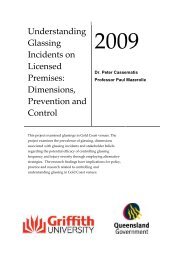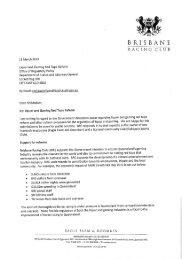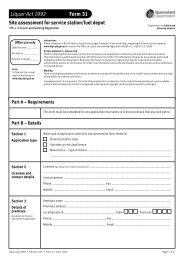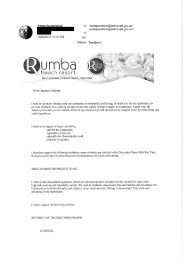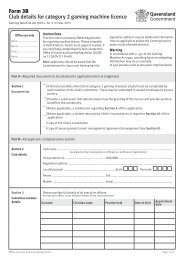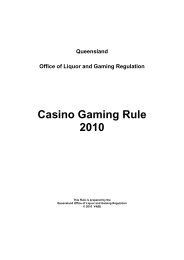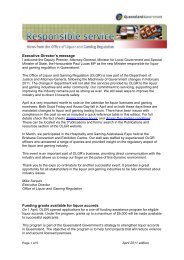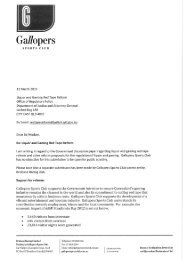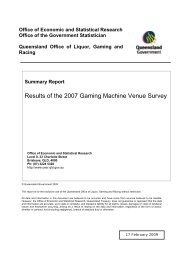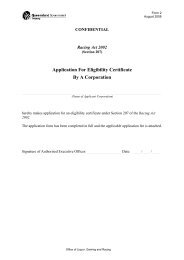CCTV Guide - Office of Liquor, Gaming and Racing - Queensland ...
CCTV Guide - Office of Liquor, Gaming and Racing - Queensland ...
CCTV Guide - Office of Liquor, Gaming and Racing - Queensland ...
You also want an ePaper? Increase the reach of your titles
YUMPU automatically turns print PDFs into web optimized ePapers that Google loves.
Department <strong>of</strong> Justice <strong>and</strong> Attorney-General<br />
<strong>Office</strong> <strong>of</strong> <strong>Liquor</strong> <strong>and</strong> <strong>Gaming</strong> Regulation<br />
<strong>CCTV</strong> <strong>Guide</strong><br />
www.olgr.qld.gov.au
Legal obligations<br />
Licensed venues located in the Brisbane City Council area, authorised to trade past 1am, are required by the <strong>Liquor</strong><br />
Act 1992 <strong>and</strong> the <strong>Liquor</strong> Regulation 2002 to operate <strong>CCTV</strong> <strong>and</strong> to do so in accordance with described st<strong>and</strong>ards.<br />
These legislative requirements <strong>and</strong> st<strong>and</strong>ards may have been imposed on other venues located in other parts <strong>of</strong> the<br />
state as a condition <strong>of</strong> licence.<br />
This guide has been designed to assist all licensees to adopt best practice st<strong>and</strong>ards for <strong>CCTV</strong> systems, including<br />
those licensees referred to above.<br />
Legislative st<strong>and</strong>ards are recognised <strong>and</strong> incorporated within the guide, however licensees must at all times ensure<br />
that they are complying with the law. If there is any inconsistency between this guide <strong>and</strong> imposed legislative<br />
st<strong>and</strong>ards or licence conditions, the legislative st<strong>and</strong>ards <strong>and</strong> licence conditions must be followed.<br />
<strong>Office</strong> <strong>of</strong> <strong>Liquor</strong> <strong>and</strong> <strong>Gaming</strong> Regulation <strong>CCTV</strong> <strong>Guide</strong><br />
CS0195_2012<br />
The material presented in this publication is distributed by the Queensl<strong>and</strong> Government for information only <strong>and</strong> is<br />
subject to change without notice. The Queensl<strong>and</strong> Government disclaims all responsibility <strong>and</strong> liability (including<br />
liability in negligence) for all expenses, losses, damages <strong>and</strong> costs incurred as a result <strong>of</strong> the information being<br />
inaccurate or incomplete in any way <strong>and</strong> for any reason.<br />
© Copyright State <strong>of</strong> Queensl<strong>and</strong> (Department <strong>of</strong> Justice <strong>and</strong> Attorney-General) 2012.<br />
2
<strong>CCTV</strong> <strong>Guide</strong>
Contents<br />
Legal obligations 2<br />
Cameras <strong>and</strong> lighting 5<br />
Emergency plan 7<br />
Security <strong>and</strong> privacy 8<br />
<strong>CCTV</strong> management plan 8<br />
<strong>Office</strong> <strong>of</strong> <strong>Liquor</strong> <strong>and</strong> <strong>Gaming</strong> Regulation <strong>CCTV</strong> <strong>Guide</strong><br />
4
Cameras <strong>and</strong> lighting<br />
At entries <strong>and</strong> exits<br />
• Cameras should cover each entry <strong>and</strong> exit <strong>and</strong> should record:<br />
–the entrance <strong>and</strong> exit <strong>of</strong> each patron<br />
–the interaction <strong>of</strong> each patron with staff.<br />
• These cameras should use a lens that will provide a recording which will enable the person(s) to be<br />
identified. See ‘identify’ st<strong>and</strong>ard in Figure 1.<br />
In the venue<br />
• Cameras should be positioned throughout the venue to record any incident that occurs.<br />
• Incidents that have occurred in the past should be taken into account when positioning internal cameras.<br />
• A wide-angle lens may be used to cover a large area <strong>of</strong> the venue, but details captured by internal cameras<br />
should be sufficient to recognise each person. See ‘recognise’ st<strong>and</strong>ard in Figure 1.<br />
External vicinity<br />
• Cameras should cover the external vicinity <strong>of</strong> each entrance/exit to a radius <strong>of</strong> 10 metres.<br />
• These cameras should provide a recording sufficient for persons to be identified. See ‘identify’ st<strong>and</strong>ard in<br />
Figure 1.<br />
Lighting <strong>and</strong> other environmental factors<br />
• Adequate lighting levels must be maintained to achieve the appropriate recording st<strong>and</strong>ards.<br />
• Flaring <strong>and</strong> other problems caused by inadequate lighting conditions or other environmental factors which<br />
obscure a person’s features should be addressed.<br />
• Refer to Figure 2 for common problems <strong>and</strong> possible solutions.<br />
Figure 1 – Identity <strong>and</strong> recognition st<strong>and</strong>ards.<br />
Identify 120%<br />
With the figure now occupying at least 120 per cent <strong>of</strong><br />
the screen height, picture quality <strong>and</strong> detail should<br />
be sufficient to enable the identity <strong>of</strong> an individual to<br />
be established beyond reasonable doubt.<br />
Recognise 50%<br />
When the figure occupies at least 50 per cent <strong>of</strong><br />
screen height viewers can say with a high degree <strong>of</strong><br />
certainty whether or not an individual shown is the<br />
same as someone they have seen before.<br />
<strong>Office</strong> <strong>of</strong> <strong>Liquor</strong> <strong>and</strong> <strong>Gaming</strong> Regulation <strong>CCTV</strong> <strong>Guide</strong><br />
5
Figure 2 – Recordings that would fail the st<strong>and</strong>ard<br />
Silhouette occurs when extremely high <strong>and</strong> low<br />
light levels are within the scene.<br />
Frequently occurs at entrances with indoor<br />
cameras facing outdoors.<br />
Keep light levels even across the scene to ensure<br />
good contrast.<br />
Flare on a camera occurs when bright light falls<br />
directly on the camera <strong>and</strong> causes colours to<br />
lack saturation, appear washed out <strong>and</strong> lose<br />
detail.<br />
Change the camera’s position or add a camera<br />
lens hood.<br />
Cameras<br />
• All cameras should be digital.<br />
• Depending on the lighting conditions, infra-red cameras may be required.<br />
• Each camera should be chosen to best make use <strong>of</strong> the available lighting.<br />
Frequency<br />
• Six frames per second (6 fps) is considered a sufficient st<strong>and</strong>ard.<br />
<strong>Office</strong> <strong>of</strong> <strong>Liquor</strong> <strong>and</strong> <strong>Gaming</strong> Regulation <strong>CCTV</strong> <strong>Guide</strong><br />
Camera views<br />
• Cameras should be positioned so that their view is not obstructed in any way.<br />
• Consider the impact <strong>of</strong> <strong>CCTV</strong> operations when mounting promotional, temporary or permanent signage.<br />
Recorded times<br />
• Licensees must comply with recording times where these are determined by legislation or by conditions<br />
<strong>of</strong> licence.<br />
• At a minimum, the recording should begin no later than 8 pm <strong>and</strong> finish no earlier than one hour after closing.<br />
• Venues should operate cameras for additional periods based on risk assessment. For example, a venue<br />
that is close to a sporting ground may choose to start recording prior to the event commencing.<br />
Display<br />
• Images should be recorded with the correct time <strong>and</strong> date, <strong>and</strong> the camera ID embedded into the image.<br />
6
Storage, retention <strong>and</strong> availability<br />
• Recordings <strong>of</strong> <strong>CCTV</strong> footage must be retained for a minimum period <strong>of</strong> 28 days (the retention period).<br />
• When an incident has been identified, the <strong>CCTV</strong> footage should be archived <strong>and</strong> retained for a minimum <strong>of</strong><br />
one year after the retention period unless it is given to police or an <strong>Office</strong> <strong>of</strong> <strong>Liquor</strong> <strong>and</strong> <strong>Gaming</strong> Regulation<br />
(OLGR) investigator earlier.<br />
• <strong>CCTV</strong> footage should be made available on request by a police <strong>of</strong>ficer or an OLGR investigator.<br />
Deletion<br />
• Where no incident has been identified, the <strong>CCTV</strong> footage must automatically be deleted within 30 days<br />
after the retention period.<br />
Archive<br />
• If an incident occurs at the venue, <strong>CCTV</strong> footage for the period leading up to, during <strong>and</strong> following the<br />
incident must be archived.<br />
• <strong>CCTV</strong> footage must also be archived if requested by a police <strong>of</strong>ficer or an OLGR investigator.<br />
• Archived footage must be made available on request by a police <strong>of</strong>ficer or an OLGR investigator.<br />
Copies<br />
• <strong>CCTV</strong> footage must be made available to police or an OLGR investigator on CD, DVD or USB flash drive.<br />
• There must be functionality to select footage to be copied based on the date, time <strong>and</strong> the camera that<br />
recorded the footage.<br />
• It is desirable that the <strong>CCTV</strong> system can export a single image in a common digital format such as JPG,<br />
PNG, TIF or BMP.<br />
S<strong>of</strong>tware<br />
• It is desirable that the footage is formatted so that it can be played in Windows Media Player or other<br />
freely available s<strong>of</strong>tware. Alternatively, footage must be supplied with viewing s<strong>of</strong>tware.<br />
Onsite support<br />
• The licensee or an approved manager must be available at all times to perform duties relating to the<br />
<strong>CCTV</strong> system.<br />
Emergency plan<br />
Power failure<br />
• The <strong>CCTV</strong> system must continue to record for at least 15 minutes during a power outage.<br />
• The <strong>CCTV</strong> system should automatically start recording after recovering from an extended power outage.<br />
System failure or inoperative<br />
• Those venues required by their licence conditions to operate <strong>CCTV</strong> must cease to serve liquor <strong>and</strong> must<br />
close the premises if <strong>CCTV</strong> is not operational or not recording at any time between 1 am <strong>and</strong> the ordinary<br />
closing time.<br />
• If <strong>CCTV</strong> becomes inoperable at any time in any venue, the risks should be assessed <strong>and</strong> the necessary<br />
precautions, such as employing additional staff, should be taken.<br />
• Where risks are high, venues should employ additional staff or close the premises.<br />
<strong>Office</strong> <strong>of</strong> <strong>Liquor</strong> <strong>and</strong> <strong>Gaming</strong> Regulation <strong>CCTV</strong> <strong>Guide</strong><br />
7
Security <strong>and</strong> privacy<br />
Recording location<br />
• The system that stores footage must be kept in a secure area that has limited access.<br />
Access<br />
• Only the licensee or an approved manager must operate the <strong>CCTV</strong> system.<br />
• Footage must only be viewed by the licensee, approved manager, police <strong>of</strong>ficer or an OLGR investigator.<br />
• A password should be needed to:<br />
–view any footage recorded on the system (this does not include live footage)<br />
–copy or archive footage<br />
–access any file management or system settings.<br />
Audit trail<br />
• A log is to be kept <strong>of</strong> all file management operations including archiving, copying <strong>and</strong> deleting. The log<br />
cannot be deleted.<br />
• The log should be reviewed regularly by the licensee or an approved manager. Irregularities should then<br />
be addressed.<br />
Patron information<br />
• Signage must be on display at the entrance to the venue alerting patrons that <strong>CCTV</strong> is installed.<br />
Other privacy issues<br />
• No copies <strong>of</strong> <strong>CCTV</strong> footage may be created for entertainment, personal use or commercial use.<br />
• Only police or OLGR investigators may leave the premises with copies <strong>of</strong> <strong>CCTV</strong> footage.<br />
• Recording <strong>and</strong> viewing <strong>of</strong> recorded <strong>CCTV</strong> footage must be undertaken for the purposes <strong>of</strong> security <strong>and</strong><br />
safety only.<br />
<strong>CCTV</strong> management plan<br />
Supplier/installer<br />
• A licensed provider <strong>of</strong> security equipment should be employed when selecting or installing the <strong>CCTV</strong> system.<br />
• The expertise <strong>and</strong> experience <strong>of</strong> the provider should be sought in order to ensure the capability <strong>of</strong> the <strong>CCTV</strong><br />
system meets the st<strong>and</strong>ards set out in this guide.<br />
<strong>Office</strong> <strong>of</strong> <strong>Liquor</strong> <strong>and</strong> <strong>Gaming</strong> Regulation <strong>CCTV</strong> <strong>Guide</strong><br />
8<br />
System maintenance<br />
• A suitable company or individual should be contracted for maintenance <strong>and</strong> repair work.<br />
• A company should be chosen that has the capacity to work during the operational hours <strong>of</strong> the venue.<br />
• A service level agreement should be entered to ensure that repairs may be carried out at short notice.<br />
System check<br />
• The system should be checked daily by the licensee or an approved manager prior to opening to ensure<br />
the system is functioning correctly.<br />
System administration<br />
• The licensee or an approved manager should be the system administrator.<br />
• The system administrator should:<br />
–create <strong>and</strong> manage passwords<br />
–carry out any changes to system settings<br />
–approve alterations to cameras or lighting.
<strong>CCTV</strong> Checklist<br />
Legal obligations<br />
St<strong>and</strong>ard<br />
<br />
<br />
<strong>Liquor</strong> Act 1992 <strong>and</strong> <strong>Liquor</strong><br />
Regulation 2002<br />
Conditions <strong>of</strong> licence<br />
Practices adopted meet legal requirements<br />
Cameras <strong>and</strong> Lighting<br />
St<strong>and</strong>ard<br />
At entries <strong>and</strong> exits<br />
Able to identify patrons entering or exiting <strong>and</strong> any interaction with staff<br />
In the venue<br />
Sufficient to view <strong>and</strong> to recognise persons<br />
External view<br />
Radius <strong>of</strong> 10 metres <strong>and</strong> able to identify persons<br />
Lighting<br />
Should enable quality to be achieved<br />
Camera<br />
Digital<br />
Frequency<br />
Minimum 6 fps (frames per second)*<br />
Camera views<br />
Not obstructed by any permanent or temporary impediments<br />
Recording <strong>and</strong> playback<br />
St<strong>and</strong>ard<br />
Recorded times<br />
At a minimum operate from 8 pm to one hour after close <strong>of</strong> business<br />
Extend hours to meet risks<br />
Display<br />
Correct time/date <strong>and</strong> camera ID embedded<br />
Storage<br />
Minimum retention period <strong>of</strong> 28 days<br />
Deletion<br />
If no incident recorded, automatically delete within 30 days after retention period<br />
Where incident recorded, archive <strong>and</strong> retain for a minimum <strong>of</strong> one year after the<br />
retention period<br />
Archive<br />
Archive on request <strong>and</strong> protect from deletion<br />
Copies<br />
CD, DVD, USB memory stick for police <strong>and</strong> OLGR investigators<br />
Able to be selected by camera/s <strong>and</strong> time<br />
S<strong>of</strong>tware<br />
Windows Media Player or must come with viewing s<strong>of</strong>tware<br />
Access<br />
Licensee or approved manager to be available at all times<br />
Emergency plan<br />
St<strong>and</strong>ard<br />
Power failure<br />
Record for 15 minutes<br />
System failure or inoperative<br />
Licensees with <strong>CCTV</strong> as a licence condition should cease service <strong>of</strong> liquor <strong>and</strong> close<br />
All venues should assess risks <strong>and</strong> take necessary precautions<br />
Security <strong>and</strong> privacy<br />
Recording location<br />
Passwords<br />
Audit trail<br />
Patron information<br />
Privacy<br />
<strong>CCTV</strong> management plan<br />
Supplier/installer<br />
System maintenance<br />
System check<br />
System administration<br />
St<strong>and</strong>ard<br />
In a locked area that stops unauthorised access<br />
Needed to access recordings or adjust settings<br />
Logs <strong>of</strong> all recordings copied <strong>and</strong>/or manually deleted<br />
Logs to be checked regularly by management<br />
Signage clearly visible at entry<br />
Equipment <strong>and</strong> recordings to be used only for security<br />
St<strong>and</strong>ard<br />
Select on qualification, reputation <strong>and</strong> licence<br />
Seek advice on <strong>CCTV</strong> system<br />
Have maintenance <strong>and</strong> emergency service arrangements<br />
Daily licensee or approved manager<br />
Duties to be assigned to a delegated approved manager<br />
<strong>Office</strong> <strong>of</strong> <strong>Liquor</strong> <strong>and</strong> <strong>Gaming</strong> Regulation <strong>CCTV</strong> <strong>Guide</strong><br />
* Please refer to legal obligations on front inside cover <strong>of</strong> this guide.<br />
9
CS0194 05/11



